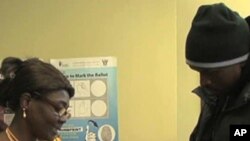Approximately four million people have registered to vote in southern Sudan’s independence referendum. Roughly 60,000 of those registered voters are casting their ballot in countries other than Sudan. In Chicago, Illinois, home to one of eight U.S. polling locations, voters are celebrating the historic moment in what could split the country of Sudan in two.
She is 27-years-old, and has spent the greater part of her relatively young life in Kenya and the United States, fleeing war in Sudan. Much of what Flora Lujana knows about her homeland of Southern Sudan comes from her family, including her father, who lives near Juba. "I feel like I know it very well through my parents and through my memories as a child. I was born there, but we fled when I was six or seven years old," she said.
Lujana says she has never before participated in an election. But with her thumbprint marking a ballot representing her vote for Southern Sudan’s independence, she is marking a first in her own life. She hopes it is a move that will change her identity. "I was always referred to as a refugee. This is the one time this term is forever gone. I am south Sudanese. So this is a very important day for me. I am not a refugee. We have independence," she said.
One of the most important days in Flora’s life was the cause of much celebration for her fellow southern Sudanese in the United States.
At a polling location in Chicago, hundreds of registered voters like Simon Gouk crowded a small polling location for the opportunity to decide Southern Sudan’s future. "Everybody will say by their voice what they want to live. Do they want to be living under the pressure of government of Khartoum or do they want to be living as free people," he said.
Many voters like Gouk got to the polling location thanks to NBA basketball star, Luol Deng. The forward for the Chicago Bulls, who is also from southern Sudan, paid for two buses that transported dozens of voters from the state of Michigan. "This is big, this is huge. Like I said we can finally do something about what has been going on. A lot of people, what we could do in the past is run. Now we are here today and everyone is showing up and we are not running," he said.
As Deng cast his vote in Chicago, he said he was doing so in part to honor the memory of another famous basketball player from southern Sudan. Manute Bol was an influential figure in Deng’s life, and guided him on the path that led to the NBA. Bol died in June. "Manute did a lot for us. I always said one thing Manute showed everyone is the heart that he had to give back to his people. Manute went through a lot, and he was the face of our nation," he said.
One of the main concerns of voters in the U.S. is the increasing violence connected to the referendum in Southern Sudan. Even though he is thousands of miles away, Deng says all Southern Sudanese around the world can help end the violence by showing up to vote. "For us people, all we can do is show up and make sure we do our part. For the violence that his going on it really breaks my heart and it is sad that it is still happening and people are still going through it as we speak right now so hopefully this will all end it," he said.
Peter Bul knows first hand how violence in Sudan can lead to war. He is one of the so-called "Lost Boys," refugees orphaned and displaced by Sudan’s second civil war. He became the face of the Lost Boys, appearing in documentaries, articles, and U.S. talk shows to raise awareness about the plight of Southern Sudan.
Bul says he is grateful to the United States for playing a role in making his vote for Southern Sudan’s independence possible. "If Lost Boys were not in America, perhaps this referendum would not be possible. But because the United States of America allowed the Lost Boys to come to this country, we are able to do our part to get our story out, to let people know what is going on in the country, and because of that I think that is what led to this day today, so," he said.
But voters like Bul and Flora Lujana temper their current excitement at the prospect of a new country with the reality that nationhood for southern Sudan is a difficult road ahead. "South Sudan has issues that have to be tackled, from political to economic, social, different communities. So it is exciting for everyone right now, but I think in back of everyone’s mind they realize there is a lot of work to be done, and that is why I am excited to be a part of it," he said.
Southern Sudan’s independence referendum runs through January 15. Electoral law requires that 60 percent of registered voters participate in the election. Organizers estimate that most, if not all, of those registered at the Chicago location will return to cast their ballot by the deadline. The final voting results could come as early as February 6.





